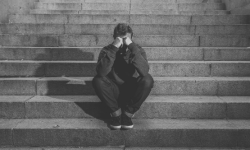20+ Years Experience
Specialist Addiction Treatment

Have you ever wondered if your intense feelings for someone could be a sign of something more than just attraction?
In today’s world, it can be difficult to distinguish between healthy love, genuine intimacy, and potentially harmful addiction.
In this blog post, we will guide you through the signs and symptoms of sex and love addiction, its impact on relationships, and the various treatment options available to help individuals regain control of their lives.
Sex or love addictions are behavioural addictions characterised by an obsessive need for intimacy and validation, leading to compulsive behaviours associated with sex or love, resulting in distress or impairment.
While both addictions share similarities, they manifest differently. Sex addiction involves an inability to control sexual activity and urges without much sexual attraction which can negatively impact various aspects of life.
Love addiction, on the other hand, is an attachment disorder marked by reliance on a partner’s attention, frequently resulting in damaging behaviour and difficulty sustaining a healthy romantic relationship.
It is crucial for sex and love addicts to seek help and support in order to overcome these challenges and build a healthier lifestyle for their mental and physical health.
The negative consequences of sex and love addiction can be far-reaching and disruptive. Individuals struggling with these addictions may experience a diminished interest in activities they previously enjoyed, a disregard for personal hygiene, and financial difficulties due to the expenditure of money on prostitutes or dating services.
Furthermore, sex and love addiction can have a detrimental effect on relationships, often resulting in infidelity, divorce, or estrangement from family members.
Additionally, one’s physical health may be adversely affected as sex and love addiction leaves them susceptible to contracting sexually transmitted diseases.
Moreover, many become vulnerable to domestic abuse as they may elect to remain with an abusive romantic partner in pursuit of fulfilling their longing for love.
Understanding the complex challenge of sexual and love addiction is crucial for those affected and their loved ones.
Recognising the signs of other addictions and seeking professional help can make a significant difference in managing these addictions and preventing relapse.
Sex addiction is characterised by an inability to control sexual urges and activities, which can have a detrimental effect on various aspects of life, including romantic relationships.
Factors contributing to the addictive nature of sex include the release of neurotransmitters such as dopamine, norepinephrine, and serotonin during sexual activity, including compulsive masturbation, which activates the reward system in the brain, potentially leading to addiction.
Individuals with sex and love addictions, including sex addicts, may experience harm to their relationships due to excessive engagement with internet pornography, financial hardship as a result of overspending, and job loss because of a heightened focus on sexual activities.
A recent study conducted in the United States revealed that 10.3% of males and 7% of females experienced distress and difficulty in regulating their sexual impulses.
The consequences of sex addiction can be profound, leading to emotional distress, heartache, or loss, with one manifestation being engaging in sexual activities with numerous sexual partners.
Love addiction, also known as co-dependency or relationship/romance addiction, is different from sex addiction. Its symptoms and patterns of behaviour are similar to that of an addiction to substances.
One may find themselves in a perpetual cycle of relationships or become fixated on a single person. It is possible to idealise partners and place them on a pedestal or continuously pursue the ‘high’ of new love.
People with a love addiction often disregard their own needs and feel desperate to please their partner so they are able to have what they would call a perfect relationship.
Additionally, one may be afraid of intimacy in a new relationship or become overly dependent on a partner for validation, love interest and self-worth. Support groups like Love Addicts Anonymous can help individuals struggling with love addiction.
False beliefs, such as “unless I am with someone, I am worthless,” can be associated with the signs of love addiction always wanting the perfect relationship.
The most effective method of addressing the signs of love addiction is to seek professional help, such as attending an inpatient rehab facility.
Recognising the signs and symptoms of sex and love addiction is essential for those affected by these behavioural addictions.
Symptoms can be both physical and emotional/psychological, making it crucial to be aware of the various signs associated with each type of addiction.
Physical symptoms of sex and love addiction can include an inability to control sexual behaviour and a compulsive need for masturbation.
Physical indications of sex and love addiction may include neglecting personal hygiene, spending an inordinate amount of time engaging in sexual activities, and engaging in risky sexual behaviour.
Neglecting personal hygiene can manifest as not showering regularly, not brushing teeth, not changing clothes, and not attending to one’s appearance.
Financial difficulties, another physical indicator, may include an inability to pay bills, difficulty in budgeting, and the accumulation of debt.
Engaging in risky behaviour can involve unprotected sexual intercourse, having multiple sexual partners, and participating in dangerous activities.
The emotional and psychological indications of sex and love addiction may include prioritising the addiction over other aspects of life, experiencing guilt or shame related to the addiction, and feeling incapable of controlling the addiction.
Emotional indications of sex addiction may include persistent and frequent sexual urges or thoughts, difficulty in restraining sexual behaviours, feelings of guilt and disgrace, preoccupation with either sexual activity, ideas or fantasies, disregarding obligations and relationships, utilising sex as a coping strategy, feeling a lack of control, and enduring emotional distress or anxiety when unable to partake in sexual activities.
Understanding sex and love addictions and identifying these symptoms can help individuals recognise if they or someone they know may be struggling with sex and love addiction, prompting them to seek professional help and support.
Various factors can contribute to the development of sex and love addiction. Identifying these factors can help individuals better understand the underlying causes of their sex or love addiction and develop effective coping strategies to address them.
By understanding the underlying causes of their addiction, individuals can develop strategies to manage their symptoms.
Childhood trauma and attachment issues have been known to be associated with the development of sex and love addiction, which can be due to low self-esteem and self-worth, thus leading individuals to seek out love and sex in inappropriate places and with inappropriate people.
Those who have endured traumatic events in childhood, such as sexual abuse or neglect, may be more likely to suffer from sex addiction in later life.
Trauma can disturb healthy attachment patterns and lead to challenges in forming and maintaining healthy relationships. It can also contribute to feelings of shame, low self-esteem, and a requirement for validation through sexual behaviours.
Moreover, childhood trauma can affect the development of coping mechanisms, prompting individuals to resort to sex addiction as a means of numbing emotional pain or achieving a sense of control.
Mental health conditions, such as depression or anxiety, can have an effect on the emergence of sex and love addiction.
Depression can result in an augmentation of detrimental sexual habits as a method to manage emotional pain.
Furthermore, individuals contending with both depression and sex addiction may resort to substance abuse as a way of self-medication.
The association between depression and sex addiction is intricate and can differ from individual to individual.
Environmental factors, such as exposure to unhealthy relationships or substance abuse, can contribute to the causes of sex and love addiction.
Peer pressure, trauma, and distorted beliefs about relationships can increase an individual’s risk of developing an addiction.
Furthermore, substance abuse can lead to feelings of loneliness and isolation, all-consuming which may further contribute to an individual’s addictive behaviours.
Sex and love addiction can have a negative impact on relationships, including damaging romantic partnerships and straining friendships and family ties.
Recognising these effects is essential in seeking appropriate support and treatment.
Addiction can be a difficult thing to overcome, and it is important to understand the impact it has on an addicted person.
Damaging romantic relationships can result from sex and love addiction, as the addiction takes precedence over the romantic partner.
Trust, emotional distance, and a lack of closeness can become issues in a romantic relationship affected by sex addiction, diminishing all-consuming the romantic intensity that once existed.
Love addiction can engender an often unhealthy dependency and reliance on the other person, family or individual, in addition to a lack of trust and communication. It may also result in feelings of culpability and humiliation, as well as a dread of abandonment.
Sex and love addiction can result in strained relationships with friends and family. This may involve a lack of trust, difficulty in communication, and feelings of guilt and shame.
The negative consequences of addiction on personal relationships, social engagement, and family ties can be profound, leading to isolation or withdrawal.
In order to overcome sex and love addiction, it is crucial to seek sex or love addiction treatment and support. Various options are available, including inpatient rehab programs, therapy and counselling, and support groups.
Inpatient rehab programs provide a safe and structured environment for individuals to focus on their recovery.
Inpatient rehab programs are intensive residential treatment programs that provide a structured environment for individuals to address the underlying causes of their addiction.
These programs offer numerous advantages, such as a structured atmosphere, round-the-clock assistance, intensive therapy, peer support, relapse prevention, and aftercare planning.
These advantages can help individuals gain the skills and knowledge they need to maintain sobriety.
Therapy and counselling can help individuals understand the root causes of their addiction and develop coping strategies to maintain healthy relationships.
A variety of therapy options are available for sex addiction, such as individual therapy, group therapy, couples therapy, family therapy, cognitive behavioural therapy and 12-step programs.
Consulting an experienced practitioner regarding sex and love addiction can be beneficial in providing the most suitable care and support.
Support groups can provide a safe space for individuals to share their experiences and receive encouragement from others who have faced similar challenges.
They are generally guided by a certified facilitator and create a secure environment for individuals to express their difficulties and gain encouragement from others who have encountered similar obstacles.
A variety of resources are available for finding support groups, such as local mental health centres, online directories, and support group websites.
Maintaining healthy relationships and preventing relapse in sexual and love addiction involves setting boundaries and developing coping skills.
Establishing healthy boundaries in relationships can be a healthy way to help individuals maintain a healthy balance between their needs and the needs of their partner.
Developing coping skills, such as mindfulness and stress management techniques, can help individuals manage their emotions and prevent relapse into sexual and love addiction.
Setting boundaries in relationships can help individuals maintain a healthy balance between their needs and the needs of their partner.
Techniques that could be useful in establishing boundaries following sex addiction treatment include defining clear and precise boundaries, prioritising self-care, obtaining support from multiple partners, establishing consequences, exercising assertiveness, and implementing healthy routines.
Defining clear and precise boundaries is essential for setting healthy relationship boundaries. This includes setting limits on what can be done.
Developing coping skills is essential for those in recovery from sex and love addiction. Following sex addiction treatment, it may be beneficial to practice self-care and develop healthy coping mechanisms, such as mindfulness and stress management techniques, in order to better manage emotions and reduce the risk of relapse.
Engaging in individual or group therapy, attending support groups, and seeking family support are other strategies that can be employed to establish a support system following sex addiction treatment.
Yes, there is such a thing as sex and love addiction. It is characterised by obsessive sexual behaviour and preoccupation with a particular sexual encounter or partner that can disrupt everyday life and affect relationships and work.
This addiction can manifest in different ways, such as compulsive viewing of pornography, multiple affairs, and compulsive masturbation. It can also lead to behavioural addiction to feelings.
The effects of sex and love addiction can be devastating, including difficulty forming and maintaining healthy relationships, increased risk for STDs, and legal issues.
Children of addicted parents often suffer long-term psychological damage, such as low self-esteem and anxiety which can often take a toll on their emotional wellbeing and can lead them to become emotionally unavailable in later life.
Withdrawal symptoms of sex and love addiction can include anxiety, depression, mood swings, and restlessness when the formerly addicted person or individual is unable to engage in their desired behaviour.
These symptoms can be difficult to manage and can lead to further addictive behaviour if not addressed. It is important to seek help from a qualified professional to ensure that the addiction is properly treated.
Sex addiction is characterised by a lack of control over sexual urges and behaviours, while love addiction involves an unhealthy obsession and dependency on another person’s attention, often resulting in destructive behaviour and difficulty maintaining healthy relationships.
Love addiction can manifest in many ways, such as an inability to be alone, an inability to let go of a relationship, or an inability to be in a new relationship, without one partner feeling a need to control the other person. It can also involve an obsession with romantic intensity or the idea of being in love.
Childhood trauma can lead to difficulty forming relationships and feelings of low self-worth, causing individuals to seek validation through sex, thus contributing to the development of sex and love addiction.
Sex and love addiction is a complex disorder that can have a devastating impact on an individual’s life. It can lead to feelings of shame, guilt, and isolation, as well as physical and psychological health problems. It can also have a negative impact on relationships, work, and relationships.
In conclusion, recognising the signs and symptoms of sex and love addiction, understanding the contributing factors, and seeking appropriate treatment are crucial steps in overcoming these challenging behavioural addictions.
By setting boundaries, developing coping skills, and maintaining a support system, individuals can regain control of their lives and build healthy, fulfilling relationships.
There are a range of other services that we can provide. Have a look at the list below for more information:




























We Aim To Reply To All Enquiries With-in 24-Hours